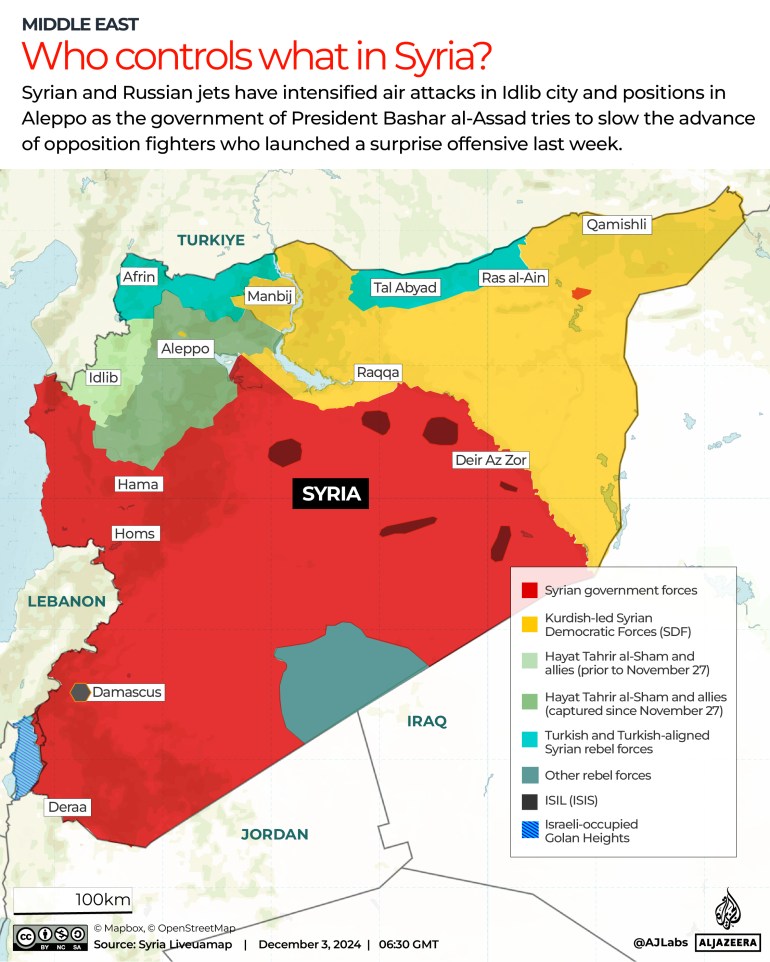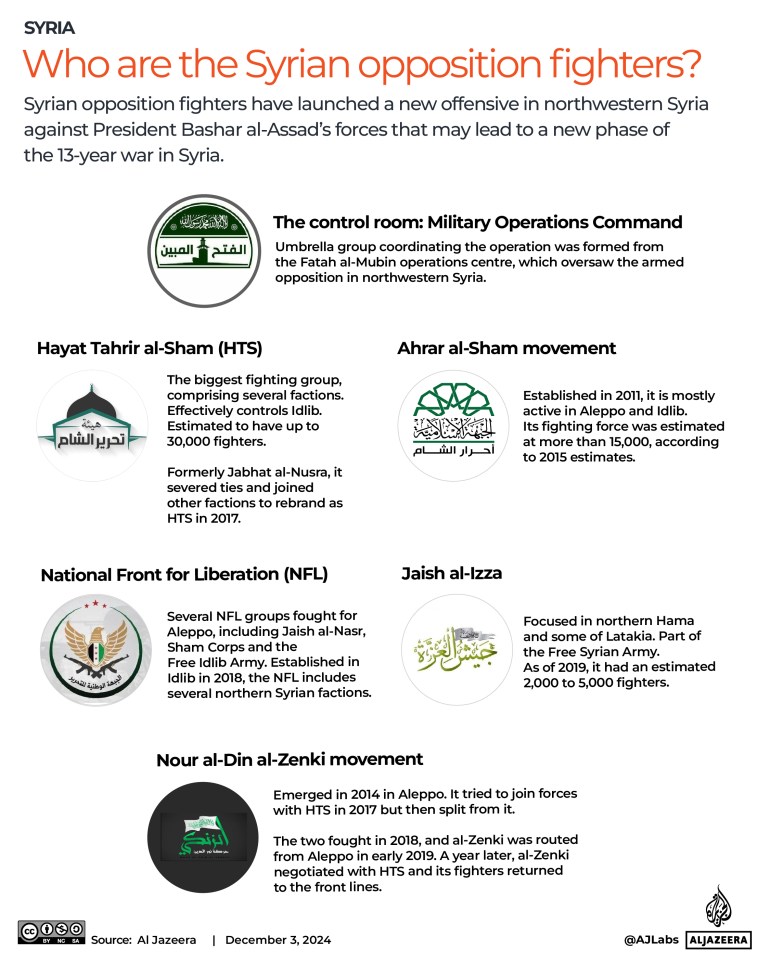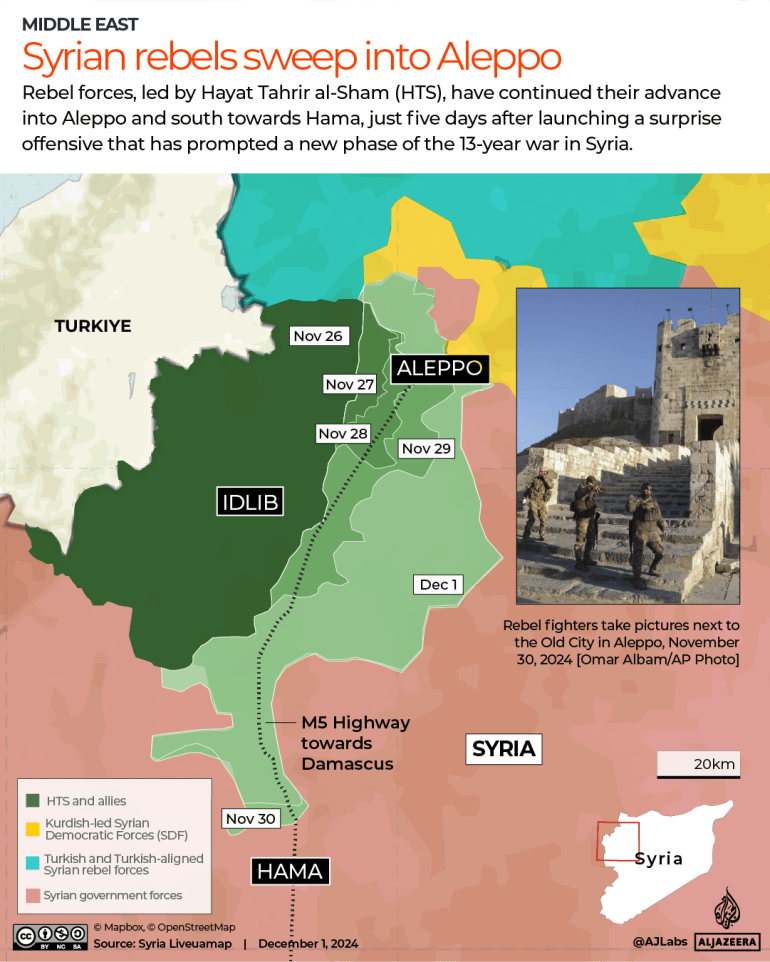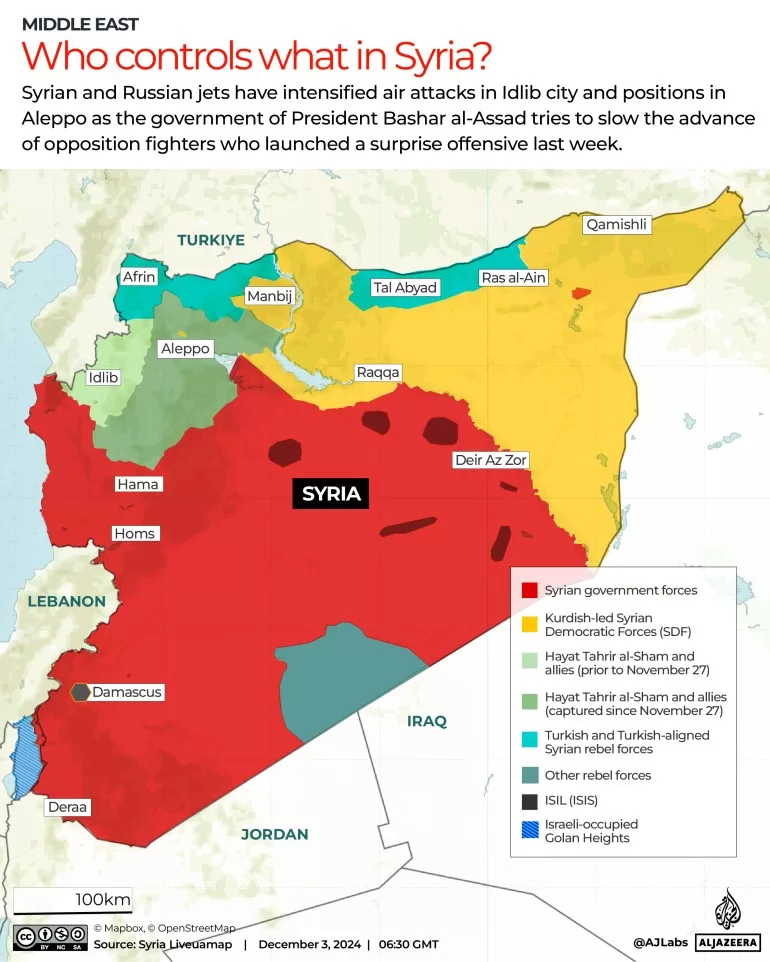The surprise assault on the Syrian city of Aleppo by opposition forces on Wednesday appears to have caught the Syrian regime of Bashar al-Assad and his allies, as well as much of the world, off guard.
Currently, as the Syrian and Russian air forces pound opposition forces in northwest Syria, the brutal conflict that many had hoped had frozen since a ceasefire deal in 2020 is showing every sign of reigniting.
Is the current fighting part of Syria’s ongoing war?
Yes.
Syria’s revolution of 2011 failed to topple the country’s leader, Bashar al-Assad.
He leaned on the support of his allies, Russia, Iran and the Lebanese group Hezbollah, who joined his forces in trying to put down the uprising.
The fighting drew in both existing regional armed groups, such as ISIL (ISIS) and al-Qaeda – who established linkages to groups in Syria – and created new factions such as Hayat Tahrir al-Sham (HTS), who led last week’s attack on Aleppo.

What are all these groups in Syria?
Many groups formed to join the war, fighting both the regime forces and, at times, each other as their ideologies clashed.
However, as the conflict wore on, and Russian and Iranian firepower began to tilt the conflict in the regime’s favour, the bulk of those groups were pushed to the northwestern governorate of Idlib especially after they were routed from Aleppo in 2016 after nearly four years of fighting.
While various rebel factions competed for dominance in Idlib, HTS emerged as the dominant faction.
Formed in 2017 through the merging of various groups, chiefly Jabhat al-Nusra, the group works through the “Syrian Salvation Government” (the opposition’s government) to administer much of Idlib’s governance, including its security, financial and judicial systems.
Jabhat al-Nusra, which had long been associated with al-Qaeda, officially broke ties with the group before HTS’s formation, rebranding itself as Jabhat Fateh al-Sham, and then HTS.
How extreme has the war been?
Near-apocalyptic.
The UN estimates that, between March 2011 and March 2021, Syria’s war killed 306,887 civilians.
More than half of Syria’s pre-war population of 21 million was also displaced by the fighting.
Aspects of the fighting were unsurpassed in their savagery.
The regime used chemical weapons and barrel bombs against civilian areas as it fought, along with its allies, to suppress the rebellion against it, not succeeding in fully putting it down.
In the power vacuums that formed, armed groups flourished and ISIL gained a foothold, establishing a “caliphate” around the Syrian city of Raqqa in 2014, a presence that inflicted violence on minorities and only came to an end in 2017 after the Western-supported Syrian Democratic Forces drove ISIL out.

What started the war?
While lack of freedoms and economic woes drove resentment of the Syrian government, it was the harsh crackdown on demonstrators that finally pushed protesters to take up arms.
In March 2011, inspired by successful uprisings in Tunisia and Egypt, pro-democracy protests erupted in Syria.
Global warming is said to have played a role in sparking the 2011 uprising.
Severe drought plagued Syria from 2007-2010, causing as many as 1.5 million people to migrate from the countryside into cities, exacerbating poverty and social unrest.
In July 2011, defectors from the military announced the formation of the Free Syrian Army (FSA), a group aiming to overthrow the government, marking a slide into armed conflict.
Didn’t lots of countries join the fighting?
They did.
Foreign backing and open intervention played a large role in Syria’s war.
Russia officially entered the conflict in 2015 and has continued to support al-Assad since. Iran and Iraq, as well as Lebanon-based Hezbollah also supported the regime.
Backing often separate opposition factions was a diverse array of states, including Turkiye, Saudi Arabia and the US, among others.
Israel also carried out air raids inside Syria, reportedly targeting Hezbollah and pro-government fighters and facilities.
Turkiye, which severed ties with al-Assad in 2011 and shares a long border with Syria’s north, has been the most closely involved.
Much of that border hems in the opposition-held areas and Syria’s Kurdish region, where Turkiye has long said members of the banned Kurdistan Workers’ Party (PKK) are operating.
Turkiye supported the FSA and tensions heightened after Syrian regime forces shot down a Turkish fighter jet in 2012 and border skirmishes broke out.
In 2016, Turkiye launched Operation Euphrates Shield into Syria, declaring that its aims were to push back ISIL from its borders, as well as the leading Kurdish party, the PYD (Democratic Union Party).

What was the international reaction to Syria’s war?
Several countries severed ties with al-Assad as the nature of his war against his people became apparent.
Syria was expelled from the Arab League in 2011 and many individual nations cut ties, including Canada, Germany, Mexico, Turkiye, the United Kingdom and the United States.
When ISIL’s presence in Syria became known, a Global Coalition against Daesh (an Arabic term for ISIL), comprising some 87 countries, began supporting the Syrian Democratic Forces to expel ISIL from Raqqa.
Hadn’t al-Assad been normalising with neighbours recently? Now what?
He was.
Aided by an apparent lull in hostilities, as well as the devastating earthquake that ripped through the country and neighbouring Turkiye in February 2023, Syria’s normalisation appeared to be under way.
Bahrain, Oman, Saudi Arabia and the United Arab Emirates began appointing ambassadors to Syria starting in 2021 while Jordan started to warm towards its neighbour after the devastating earthquakes that hit Syria and Turkiye in February 2023.
The Arab League, which suspended Syria in 2011, restored its membership in May 2023. There were even overtures made to start talks between Syria and Turkiye.
It is not clear what impact this escalation will have on al-Assad’s international overtures, especially after several countries called him out for refusing to negotiate with the opposition to resolve the long-simmering conflict.
